Table of Contents
Do you suddenly feel like your legs and ankles are swollen, your whole body has become heavier, and you don’t feel like you are in your own skin? Don’t worry, there’s no need to panic right away that you’ve put on a few pounds of fat, or that you need to seek out detoxes and diets. Excessive water retention in your body is probably to blame. This can have multiple causes, and often you may be able to deal with the problem yourself. In today’s article, therefore, we will take a closer look at the role of water in the body, what causes excessive water retention and how you can get rid of it.
What percentage of the human body is water and why is it so important?
In an adult human, water makes up approximately 45 – 65% of the body, with most of it inside the cells and a smaller proportion outside the cells. In men in particular, the proportion of total body water tends to be towards the upper limit, while in women it is more around 55%. This is due, for example, to the fact that men have more muscle mass, which contains water. It is normal for the volume of water in the body to change by about 5% during the day. This may be due to what you eat, drink, how much you sweat or if you have exercised. Let’s see how this is reflected on your weight. [1–2]
- For an average 80 kg man who has 65% water in his body, water weighs approximately 52 kg. With a 5% variation, the weight of water can vary by up to 2.6 kg. Thus, it is quite normal for the weight of this average man to fluctuate between 77.4 – 82.6 kg on days just due to more or less water retention.
- For an average 65 kg woman who has 55% water in her body, water weighs approximately 36 kg. With a 5% variation, the weight of water can vary by up to 1.8 kg. Thus, it is common for the weight of this average woman to vary only in relation to water retention, ranging from 63.2 – 66.8 kg.
When you see the extent to which water can affect your weight, you may have just labelled it as enemy number one, which just confuses you and sabotages your progress. But that’s definitely not the case. In fact, water has a number of important functions in the body that we couldn’t perform without.
What function does water have in the body?
Without water in the body, a person would not be able to function and would not survive a single day. It is essential for vital processes.
- Water is a natural part of every cell. They would not be able to exist without it.
- It regulates internal body temperature, for example through sweating.
- It is involved in the transport of important nutrients.
- It helps with the excretion of waste products (e.g. urine).
- It moisturises tissue in the eyes, nose and mouth.
- It helps to dissolve micronutrients to make them more accessible to your body.
- It protects body organs and tissue.
- It lubricates the joints. [1, 3]
And these are just some of the functions in which water participates. Therefore, you should see it first and foremost as a friend that helps your body to function properly. Its importance is also demonstrated by the way its deficiency manifests itself. After just a few hours without drinking, you may start to notice the first signs of dehydration, which may gradually worsen. These include thirst, muscle weakness, dizziness and headaches. Read more about these negative symptoms and the importance of hydration in our article How Insufficient Water Intake Affects Your Health. [4–5]

How much water should you drink?
While water is important for the body, it doesn’t mean that you should be mindlessly pouring through ten litres a day. In fact, in this case, more is better does not apply. There are also pitfalls to excessive water intake, which can lead to water intoxication and actually cause hyponatraemia. This is a condition in which excessive water intake dilutes the ions in the body (especially sodium), causing the body to collapse and even death. This dilution is compounded by the fact that, for example, athletes lose extra sodium through sweat, but then do not replenish it with plain water.
The results of a study conducted on 488 marathon runners showed that hyponatremia occurred in a large proportion of non-elite runners. There are even cases where a person died from hyponatremia. One of them was a Boston Marathon runner in 2002. Thus, athletes who engage in high-intensity training or several hours of endurance activity should supplement ions in addition to fluids, for example in the form of tablets or a sports drink. [6–7]
So try not to drink too much or too little. Ideally, stick to the recommended intake of 30 – 45ml per kg of body weight. In case you are exercising, or it is a hot summer day, it can even be a little more. However, optimal water intake is just one of many factors that influence whether we retain higher amounts of water and are bloated. In fact, it’s not enough to just drink the ideal amount of fluids. Other factors also play a role.
You might be interested in these products:
Causes of excessive water retention in the body
If you’ve been waking up feeling heavy, swollen and your clothes are somehow tighter lately, you’re surely looking for possible causes of this problem. Here are some of them.
1. Hormonal changes
The most common hormonal changes in women are related to their menstrual cycle. In particular, during the luteal phase, which begins after ovulation and ends on the first day of menstruation, there is an increase in the hormone progesterone, which itself can cause increased water retention and swelling. However, it can also increase your cravings for highly processed foods rich in carbohydrates and salt. Well, more food, especially highly processed food, can also go hand in hand with higher water retention. A bloated body and similar difficulties due to hormonal changes can also be observed by women in pregnancy or menopause. Likewise, hormonal changes caused by contraceptive use may also be to blame for water retention. [8-9]
You can read more about the hormones associated with your menstrual cycle, PMS and its symptoms in our article 9 Tips to Relieve Painful Menstruation and Harmonise Your Cycle.
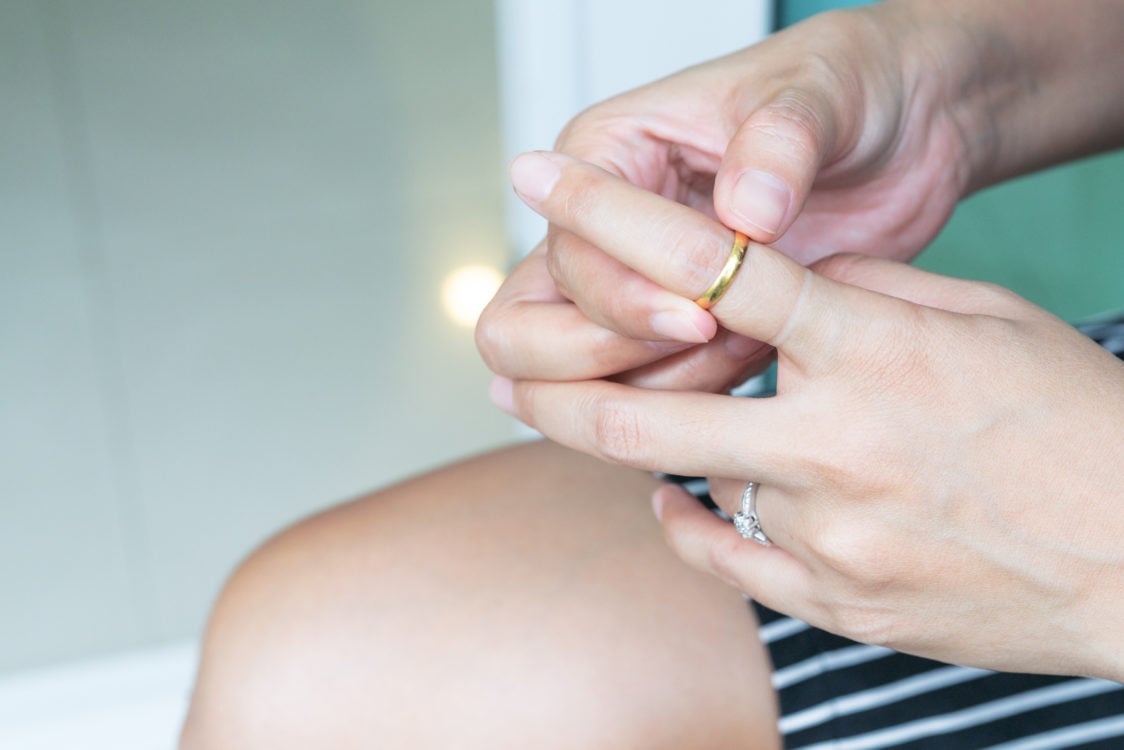
2. Change your eating habits
If one had to point to one type of food that can cause greater water retention in the body, it would be ultra-processed foods rich in carbohydrates and salt. The sodium in salt is involved in water regulation in the body, and excessive amounts of it can also cause higher water retention. However, carbohydrates also play a role. One gram of the carbohydrate (glycogen) stored in muscles naturally binds approximately 3g of water. So, if you have been on a low-carbohydrate diet for some time and suddenly return to your former eating habits, bloating can be a common consequence. [10-11]
3. Lack of exercise
Greater water retention can often be experienced by people who have a sedentary lifestyle. However, the feeling of heavy and swollen legs can also be caused by sitting for long periods of time, during which the body is not able to pump blood as efficiently. As a result of gravity, swelling of the ankles occurs. Typically, this problem also occurs, for example, when travelling for long periods of time, sitting for hours in a car, bus or plane.
The movement of the body during physical activity then helps to dilate blood vessels and promotes water circulation in the body. This is because physical activity increases blood flow, which redistributes body fluids. This can be seen, for example, in a reduction in swelling of the lower limbs. In the same way, sport can also help to circulate lymph or reduce the appearance of cellulite. [12]
4. Inadequate drinking habits
We have already discussed the consequences of excessive water intake above in relation to hyponatraemia. However, insufficient fluid intake also has its negative effects. Not drinking and waiting for the body to get rid of the excess fluid does not work. In this case, the principle is rather the opposite. The body tends to start to perceive water as a scarce commodity and hold on to it as much as it can. Instead of getting rid of water, it then tries to hold on to every drop you give it. And by doing so, you encourage water retention. Not to mention that it also builds up waste substances in the body that should be eliminated through urine. [38]
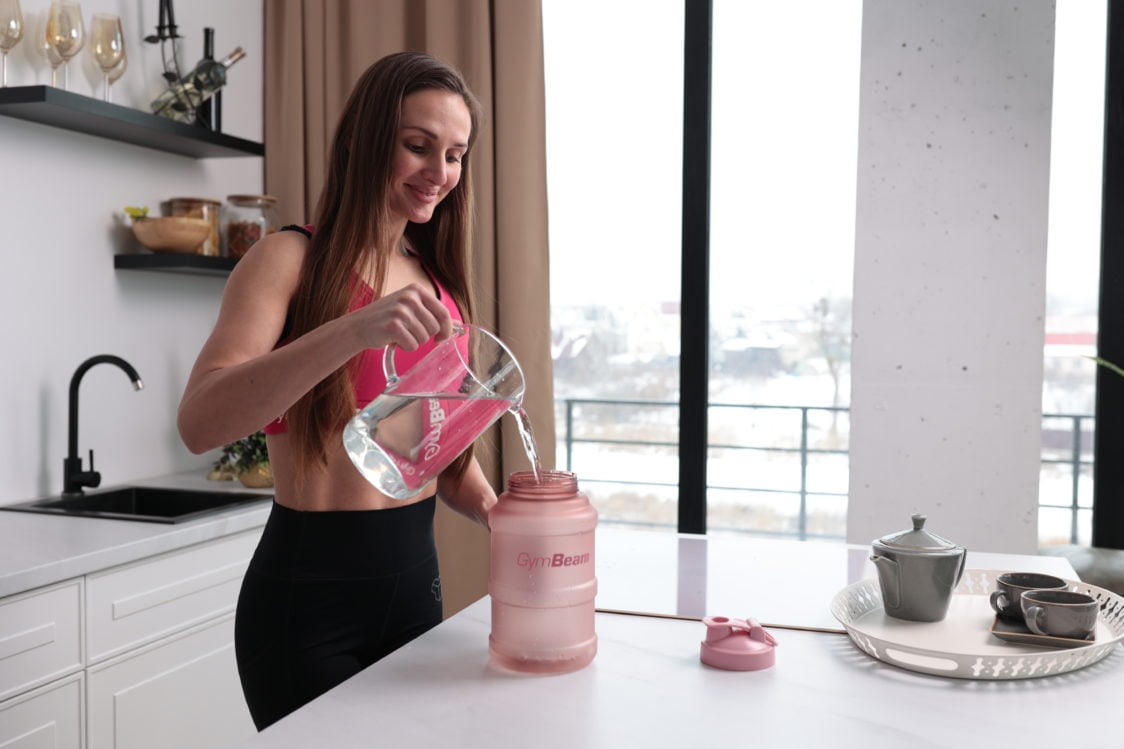
5. Excessive stress
When you are stressed, your body’s levels of the stress hormone cortisol increase. This then directly affects ADH (antidiuretic hormone), which affects the body’s water regulation. Stress can also lead to water retention in the body and swelling. [13-14]
Adaptogens can also help you manage stress. Find out how they work and which ones are really effective in our article Adaptogens: Natural Substances that Help Manage Stress.
6. Lack of sleep
You may not have realized how much sleep can affect your body’s water intake. In fact, lack of sleep is perceived by the body as stress to some extent, which again can lead to an increase in the stress hormone cortisol. And this affects the antidiuretic hormone, which can cause higher water retention in the body. Similarly, lack of sleep can also affect levels of the hunger and satiety hormones (leptin and ghrelin). As a result, you may feel less satisfaction after eating and naturally seek out more calorie-dense, highly processed foods rich in salt and carbohydrates. And these can exacerbate increased water retention. [15]
If you’re wondering what other negative effects sleep deprivation has, you shouldn’t miss our article What Happens to Your Body When You Don’t Get Enough Sleep?
7. Hot weather
Do you find your body retaining more water on hot summer days? The hormone aldosterone, which is involved in fluid conservation in the body, is to blame. It allows your kidneys to retain more water and also reduces the amount of salt in your sweat. More of it stays in the body, making the body able to retain more water and ensure optimal hydration. However, you may experience the feeling of a swollen body, which is a common side effect. [16]
8. Drinking alcohol
Have you ever tried having a few beers to quench your thirst? Aside from the hangover, you could also be looking at a pretty dehydrated and bloated body in the morning. How is that possible?
As is known, alcohol has diuretic effects. After its consumption, the body excretes more water through urine, which leads to dehydration. The body reacts by trying to retain water so that it does not lose any more of it. As a result, you may often experience swelling of the face, legs and other parts of the body after a boozy party. [17]
In addition to dehydration, swelling is also caused by an imbalance of electrolytes, which the body also gets rid of through urine. Likewise, excessive sodium intake through salt, for example, can lead to it. When you add salty chips and peanuts to your drinks and finish the evening with a kebab at the station while waiting for the night bus, you give your body an extra incentive to retain water. [18-19]
The easiest way to avoid swelling due to drinking alcohol is abstinence. However, if you like to have wine, beer or a drink, always try to supplement it with soft drinks and avoid eating ultra-processed foods that you wouldn’t eat sober.
And if you do overdo it at a party with alcohol, then you will certainly find some useful advice in our article – Hangovers: Why It Occurs and How to Get Rid of It Quickly.

9. Regular use of medication
If you have a health problem and take medication regularly, this may be one of the reasons why your body retains more water, and you feel bloated. In addition to the aforementioned hormonal contraceptives, corticosteroids, non-steroidal anti-inflammatory drugs and some types of type 2 diabetes medications can also cause this problem. [20]
10. Lymphatic system disorder
The lymphatic system plays a key role in maintaining fluid balance in the body. If you have problems with it, you may experience bloating either all over your body or in one place only (called local lymphoedema). A healthy lifestyle, compression clothing or lymphatic massage, for example, can help with lymphatic problems. However, it is advisable to consult a doctor. [21]
As you can see, there can be many reasons why your body retains water. But fortunately, there are also a number of ways that can help you get rid of this problem. Don’t worry, of course, we won’t recommend extremes such as long sauna sessions, bathing in hot water, running around in a winter jacket when it’s 30 °C outside, avoiding food or drink and so on. Such attitudes do not belong in the healthy lifestyle of the average person. Therefore, let’s leave them to athletes who get rid of excess water before competitions.
Rather, in the article, we will focus on how to healthily ensure a normal level of water in your body that makes you feel good and doesn’t make you feel uncomfortable. Always keep in mind, however, that the volume of water in your body is variable, which can also cause different changes in your weight. So don’t worry too much about it and don’t be alarmed if one day you have a kilo more than usual on the scale.

7 tips to get rid of excess water in the body
If you’re a healthy person, and you’re suffering from a bloated and swollen body, it’s possible that a certain area of your lifestyle is to blame. Fortunately, you can largely influence it yourself and incorporate changes that can help you reduce or completely eliminate water retention.
1. Exercise and keep moving during the day
Lack of exercise is one of the main reasons why the body retains water. Probably everyone has experienced the feeling of swollen ankles and your legs getting a bit heavy after sitting during the lecture or in the office all day, right? People who have a sedentary lifestyle are significantly more likely to experience swelling caused by water retention throughout their lives. Lack of exercise also goes hand in hand with obesity, which is also associated with higher water retention in the body. [22, 39]
Movement will help to stimulate the lymphatic system, blood circulation, flush out unnecessary substances from the body and get the whole body moving. It can also help us to maintain an optimal weight and thus water volume in the body. As far as general exercise recommendations are concerned, every person should engage in at least 150 minutes of moderate-intensity activity or 75 minutes of high-intensity activity per week. However, this is the bare minimum. Ideally, you should try to incorporate a higher amount of activity into your life. And it’s up to you whether you go for a walk, to the gym, cycling or swimming. Everything counts. [23-24]
Don’t know which sports activity to start with? These articles might inspire you:
- How to Start Running? A Simple Guide for Complete Beginners.
- Mental Well-Being, Weight Loss and Better Sleep. What AreOther Benefits of Hiking?
- Strength Training for Women? Yes! 12 Reasons to Pump Iron.
- Cycling Can Help Tone Legs, Buttocks and Lose Weight. What Else Can It Do?
Don’t forget to keep up the exercise even when travelling
Try to keep up the exercise while travelling. Sitting in the car for long periods of time, munching on goodies to make the journey go smoothly, is the perfect situation for retaining water in your body. Even more so if you don’t drink enough, so you don’t have to keep stopping to use the toilet. Whenever you can, try to walk, stretch or do a few squats. Of course, you should also alternate positions when sitting for long periods of time. It can also help to cross your ankles and not cross your legs when sitting. [40-41]

2. Watch your salt intake
I’m sure you’ve heard that you need to watch your salt intake in your diet. But why? Apart from the fact that regular high salt intake can gradually lead to the development of health problems, including high blood pressure or other cardiovascular problems, it can also cause excessive water retention. Salt is a source of sodium, which is one of the main electrolytes involved in water regulation in the body. [25]
It is generally recommended that a person should consume around 5 g of salt per day. The amount may be slightly higher for very active athletes, who sweat more and may lose relatively high amounts of salt. However, a large proportion of the population consumes much more salt, around 9-12 g per day, which is about double the recommended daily intake. The aim should therefore be to reduce this amount. [26-27]
How to reduce your salt intake?
- Avoid fast food and ultra-processed foods. One fast food meal can easily reach your total recommended daily salt intake.
- The easiest way to optimize your salt intake is to prepare your meals at home. In this case, you have control over how much you use when cooking.
- Similarly, when preparing food, remember that the taste of food can be enhanced by more than just salt. How about giving herbs a shot?
- If you use seasoning mixes, read their ingredients. They often already contain salt, so there is no need to add more salt to your food.
- Think about the fact that you already take in salt from everyday foods such as cheese, cold cuts and baked goods, so there is no need to add extra salt to your food.
If you want to focus on your salt intake, read the food packaging label, where you will also find information on the amount of salt used. You may be surprised to find it in products you wouldn’t expect.
Want to learn more about how to read the manufacturer’s information on packaging? Then you shouldn’t miss our article on 7 Tips on How to Make the Right Food Choicesand Purchase Groceries.
3. Optimize your carbohydrate intake and eat healthier
Don’t worry, we’re not going to tell you a story about the bad carbs that can make you gain weight. That myth has long since been debunked. But that doesn’t mean you should stop worrying about their intake. If you’re eating one sweet after another during the day, snacking on doughnuts or buns, and washing it all down with a sweetened drink, fruit smoothie or flavoured milk, chances are you’re overdoing it with carbs. And, as we’ve already discussed, carbohydrates bind water to themselves, which can manifest itself as swelling when you excessively consume them.
You may be thinking of a solution in the form of a low-carbohydrate diet. But don’t go there. It may be that the lower carbohydrate intake will cause the body to retain less water, so the weight will drop quickly during the first few days. However, this style of eating is not sustainable for many people in the long term. Well, guess what happens when a person goes back to their old eating habits, which include higher amounts of carbohydrates. Sure enough, the water comes back and so does the weight. [28]
So don’t be tempted by these results and instead focus on a quality diet that balances all the macronutrients. Stick to a happy medium and don’t overdo anything. And if you don’t know how much protein, carbs and fat you should be eating, our energy intake calculator will help you calculate it all for you.
The advice in our article can help you create a healthy diet – What Is a Healthy Diet and How to Learn to Eat Healthily?
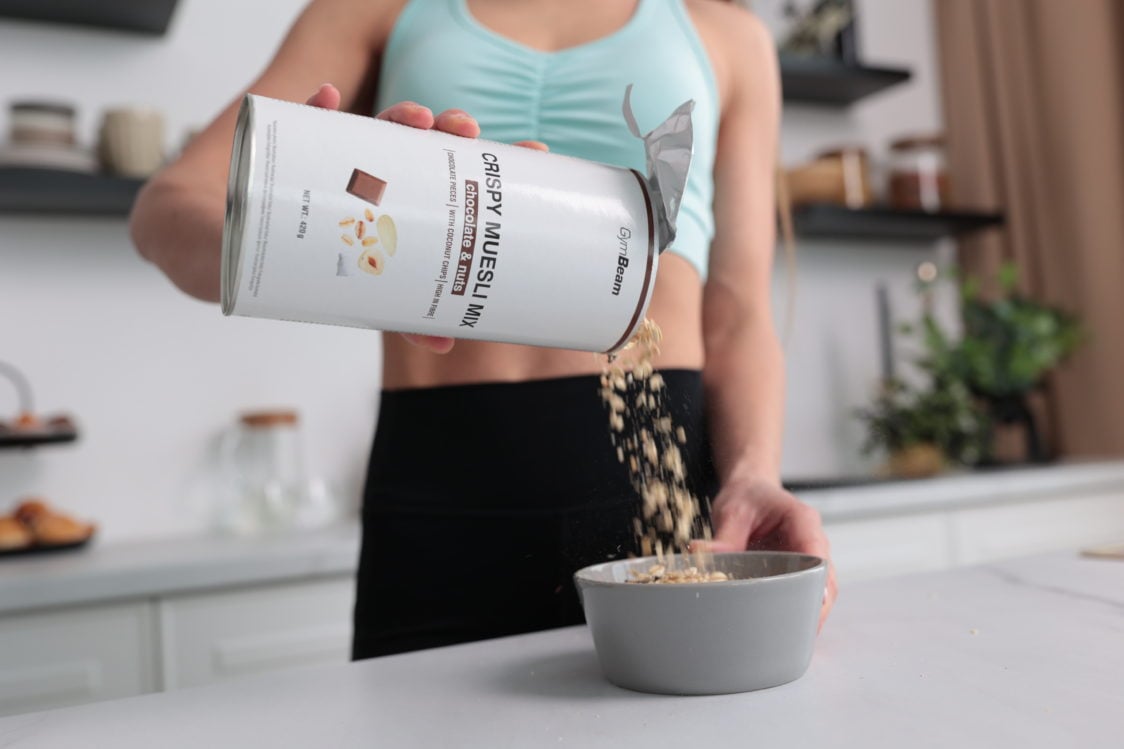
4. Drink plenty of water
Optimal hydration is essential for a properly functioning healthy body. Thus, you should neither drink too much nor too little. The ideal amount is generally considered to be 30 – 45ml of water per kg of body weight. You should try to get close to these values, even if you are concerned about water retention. You certainly don’t need to be afraid of fluids. It doesn’t work in the way that you think that if you drink 500ml of water and then suddenly become bloated. There are many factors that influence what happens to the fluid you intake in your body. [29]
Equally, however, you shouldn’t find yourself in a situation where you realize in the evening that you’ve only had one glass of water all day and start to make up for it. You’d probably spend the whole night constantly going to the toilet, and you could also put unnecessary strain on your kidneys. Their water filtration rate is approximately between 0.8 – 1 litres of water per hour. Therefore, larger amounts of water should not be consumed rapidly. [30]
Therefore, evenly distribute the necessary fluids throughout the day. To make sure you don’t forget to drink water, you can set regular reminders on your phone to drink a glass of water. You’ll see that you’ll gradually get used to it, and eventually you won’t even need the reminders.
As well as possibly improving your problems with a bloated body, sufficient fluid intake will also help you avoid the unpleasant symptoms of dehydration. Read more about these in our article How Insufficient Water Intake Affects Your Health.
5. Learn to manage stress better
We all experience some level of stress in our lives, it’s normal. There is even positive stress that can help energize your body and get the most out of yourself. However, if you feel debilitating stress for a long period of time, more of the stress hormone cortisol is released in the body. This can result in greater water retention. [13-14]
There are many ways to better manage stress, you just need to find one that works for you. For example, exercise, sufficient rest, a relaxing bath, meditation or a walk in the great outdoors can help to reduce tension and cortisol levels.
For more tips on reducing stress, see our article Why Is Stress Dangerous and How to Reduce It?
6. Get enough sleep
Sleep has a big impact on many aspects of our lives. And water retention is no exception. Good quality sleep is essential for maintaining hormonal balance in the body, which in turn has a further impact on water management. That’s why it’s ideal to get 7 – 9 hours of undisturbed sleep every day. [30-31]
In case you have trouble falling asleep, read the helpful advice in our article How to Fall Asleep Quickly? Try Our Simple Tips for a Better Sleep.
7. Try dietary supplements
The key to a healthy body that does not need to retain excess water is a healthy diet, exercise, adequate sleep and a life free of excessive stress. Moreover, there are some dietary supplements that can help you on this journey to get rid of excess water. Which ones are they?
- Electrolytes help replenish trace elements that a person loses, for example, through sweat. Since some of these (such as sodium and potassium) are involved in the body’s water regulation, their optimal intake can help prevent excessive water retention.
- Potassium, together with sodium, contributes to the body’s water regulation. Its optimal intake can thus help prevent excessive water retention. [32]
- Water Loss is a unique complex of natural extracts, magnesium and vitamin B6 for women who feel that their body retains excess water. It contains extracts from plants that are considered natural diuretics. As a result, they can help eliminate excess water.
- Caffeine is a substance that is again known for its diuretic effects. However, studies suggest that the body can adapt to regular intake of higher doses of caffeine, gradually reducing this effect. [33]
- Magnesium and its functions in the body are intertwined with other electrolytes that affect the body’s water regulation. In addition, research shows that this mineral can help reduce water retention in the body related to PMS. [34–35]
- Dandelion Extract can increase the frequency of urination, thereby helping to reduce water in the body, according to a scientific study. [36]
- You can also give other herbs a chance, including fennel, horsetail or nettle, which are also associated with diuretic effects. [37]
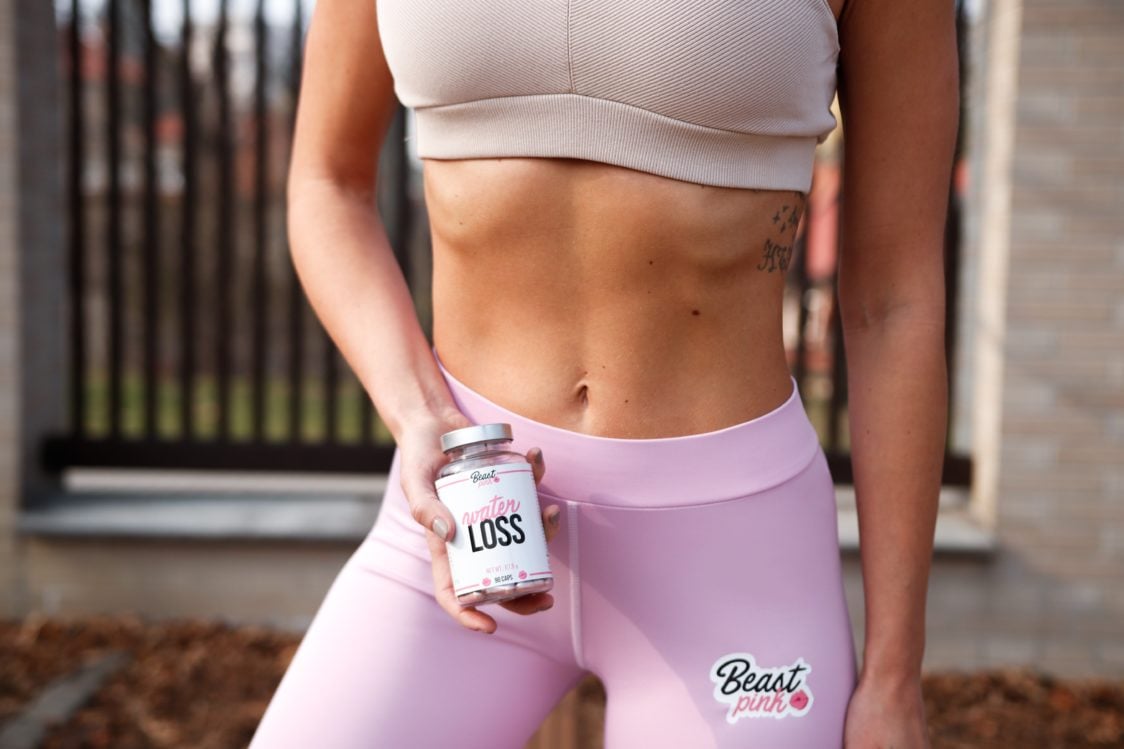
What should you remember?
After reading today’s article, you already know that many factors influence the amount of water in the body. However, some fluctuation is a natural phenomenon in this respect, so there is no point in stressing about the fact that today you have one kilo more than yesterday. If you want to feel good in your body, focus on a healthy diet, water intake routine, sufficient exercise, quality sleep and better stress management. You’ll see that you’ll feel better, and your body will have no reason to hold on to excess water. And if you can’t get rid of this problem even with a healthy lifestyle, you should try to see a doctor.
Do you have someone among your friends who complain of swollen feet and face due to water retention? Share this article with them and help them finally find the cause.
[1] The Water in You: Water and the Human Body – https://www.usgs.gov/special-topics/water-science-school/science/water-you-water-and-human-body
[2] W C Chumlea et al. – Total body water data for white adults 18 to 64 years of age: the Fels Longitudinal Study – https://pubmed.ncbi.nlm.nih.gov/10411699/
[3] Water: Essential to your body – https://www.mayoclinichealthsystem.org/hometown-health/speaking-of-health/water-essential-to-your-body
[4] Friedrich Manz – Hydration and disease – https://pubmed.ncbi.nlm.nih.gov/17921462/
[5] Barry M. Popkin et al. – Water, Hydration and Health – https://www.ncbi.nlm.nih.gov/pmc/articles/PMC2908954/
[6] Christopher S D Almond et al. – Hyponatremia among runners in the Boston Marathon – https://pubmed.ncbi.nlm.nih.gov/15829535/
[7] Fluid Cited in Marathoner’s Death – https://apnews.com/article/424edce6ed89d8adcb14d4d97c0448a3
[8] Tacani P. et al. – Characterization of symptoms and edema distribution in premenstrual syndrome – https://www.dovepress.com/characterization-of-symptoms-and-edema-distribution-in-premenstrual-sy-peer-reviewed-fulltext-article-IJWH
[9] Weight gain during period: What to know – https://www.medicalnewstoday.com/articles/327326
[10] Kreitzman, S. – Glycogen storage: Illusions of easy weight loss, excessive weight regain, and distortions in estimates of body composition – – https://doi.org/10.1093/ajcn/56.1.292S
[11] How much sodium (salt) is too much for my heart? – https://ro.co/health-guide/how-much-sodium-salt-is-too-much-for-my-heart/
[12] What is water weight and 6 easy ways to lose it – https://ro.co/health-guide/water-weight-and-ways-to-lose-it/
[13] William E. Segar, Ward W. Moore The regulation of antidiuretic hormone release in man – https://www.ncbi.nlm.nih.gov/pmc/articles/PMC297375/
[14] B Dugué et al. – Effects of psychological stress on plasma interleukins-1 beta and 6, C-reactive protein, tumour necrosis factor alpha, anti-diuretic hormone and serum cortisol – https://pubmed.ncbi.nlm.nih.gov/8266000/
[15] Shahrad Taheri et al. – Short sleep duration is associated with reduced leptin, elevated ghrelin, and increased body mass index – https://pubmed.ncbi.nlm.nih.gov/15602591/
[16] To what degree is a person's body weight affected by the ambient temperature and humidity? Do we conserve or release water as the climate changes? – https://www.scientificamerican.com/article/experts-body-wieght-ambient-temperature/
[17] What causes a puffy face in the morning? – https://www.medicalnewstoday.com/articles/puffy-face-in-the-morning
[18] Why Alcohol Can Cause Swelling and Puffiness — and What to Do About It – https://www.livestrong.com/article/526475-can-drinking-alcohol-cause-your-body-to-become-swollen/
[19] Edema – https://my.clevelandclinic.org/health/diseases/12564-edema
[20] Natalie S Evans, Elizabeth V Ratchford – The swollen leg – https://journals.sagepub.com/doi/full/10.1177/1358863X16672576
[21] Irina Bobkova et al. – Edema in Renal Diseases – Current View on Pathogenesis – https://journals.sagepub.com/doi/10.5301/pocj.5000204
[22] Soroush Besharat et al. – Peripheral edema: A common and persistent health problem for older Americans – https://journals.plos.org/plosone/article?id=10.1371/journal.pone.0260742
[23] Friedenreich, Orenstein (2002) – Physical Activity and Cancer Prevention: Etiologic Evidence and Biological Mechanisms – https://doi.org/10.1093/jn/132.11.3456S
[24] Colcombe a kol. – Aerobic Fitness Reduces Brain Tissue Loss in Aging Humans – https://academic.oup.com/biomedgerontology/article/58/2/M176/593589
[25] The trouble with excess salt – https://www.health.harvard.edu/staying-healthy/the-trouble-with-excess-salt
[26] Salt: the facts – https://www.nhs.uk/live-well/eat-well/food-types/salt-nutrition/
[27] Salt reduction – https://www.who.int/news-room/fact-sheets/detail/salt-reduction
[28] Valentín E Fernández-Elías et al. – Relationship between muscle water and glycogen recovery after prolonged exercise in the heat in humans – https://www.researchgate.net/publication/275410886_Relationship_between_muscle_water_and_glycogen_recovery_after_prolonged_exercise_in_the_heat_in_humans
[29] Robert G Hahn Effects of diet, habitual water intake and increased hydration on body fluid volumes and urinary analysis of renal fluid retention in healthy volunteers – https://pubmed.ncbi.nlm.nih.gov/32430554/
[30] Min A Joo, MD, Eun Young Kim, MD, PhD – Hyponatremia caused by excessive intake of water as a form of child abuse – https://e-apem.org/journal/view.php?doi=10.6065/apem.2013.18.2.95
[31] Gerald F DiBona, Murray Esler – Translational medicine: the antihypertensive effect of renal denervation – https://pubmed.ncbi.nlm.nih.gov/19955493/
[32] Potassium – https://examine.com/supplements/potassium/
[33] R. J. Maughan, J. Griffin – Caffeine ingestion and fluid balance: a review – https://onlinelibrary.wiley.com/doi/abs/10.1046/j.1365-277X.2003.00477.x?casa_token=f7jW0a-8RpEAAAAA%3ApQq_7Uz084lZPknNHqyxxDuyxm-pTeQTXLipruhctb0vqkM_Vi__2hNPdIt9nM0qWsqCjq0YiOGlBys
[34] Nahid Fathizadeh et al. – Evaluating the effect of magnesium and magnesium plus vitamin B6 supplement on the severity of premenstrual syndrome – https://pubmed.ncbi.nlm.nih.gov/22069417/
[35] A F Walker et al. – Magnesium supplementation alleviates premenstrual symptoms of fluid retention – https://pubmed.ncbi.nlm.nih.gov/9861593/
[36] Bevin A Clare et al. – The diuretic effect in human subjects of an extract of Taraxacum officinale folium over a single day – https://pubmed.ncbi.nlm.nih.gov/19678785/
[37] Danilo Maciel Carneiro et al. – Randomized, Double-Blind Clinical Trial to Assess the Acute Diuretic Effect of Equisetum arvense (Field Horsetail) in Healthy Volunteers – https://pubmed.ncbi.nlm.nih.gov/24723963/
[38] Water Balance – https://open.oregonstate.education/aandp/chapter/26-2-water-balance/
[39] Hon Shing Ong et al. – How 40 kilograms of fluid retention can be overlooked: two case reports – https://www.ncbi.nlm.nih.gov/pmc/articles/PMC2628868/
[40] Richard H Sterns, MD et al. – Patient education: Edema (swelling) (Beyond the Basics) – https://www.uptodate.com/contents/edema-swelling-beyond-the-basics/print
[41] Tips to avoid lower leg swelling and deep vein thrombosis during prolonged travel – https://www.uptodate.com/contents/image?imageKey=PI%2F71028&topicKey=PI%2F4413&source=see_link

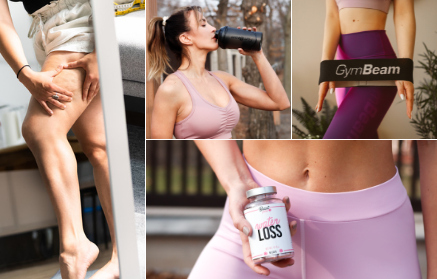
Add a comment